Email marketing is a powerful tool that offers numerous benefits for businesses. One of the top advantages is its cost-effectiveness. Compared to traditional marketing methods, email marketing is relatively inexpensive. Businesses can reach a large audience at a fraction of the cost of other advertising channels. This makes it an ideal choice for small businesses or those with limited marketing budgets.
Another unbeatable benefit of email marketing is its ability to target specific audiences. With email marketing, businesses can segment their email lists based on various criteria such as demographics, interests, or purchase history. This allows for highly targeted and personalized messaging, resulting in higher engagement and conversion rates. By sending relevant content to the right people, businesses can maximize the effectiveness of their marketing campaigns.
Email marketing also provides small businesses with valuable data and insights. Through email analytics, small businesses can track various metrics such as open rates, click-through rates, and conversion rates. This data helps small businesses understand the effectiveness of their email campaigns and make data-driven decisions to optimize their marketing strategies. By analyzing the data, businesses can identify trends, preferences, and behaviors of their audience, enabling them to tailor their marketing efforts for better results.
Building and nurturing customer relationships is crucial for mirco business success, and email marketing excels in this area. By regularly sending valuable and relevant content to subscribers, businesses can establish trust and credibility with their audience. Email allows for direct and personalized communication, which helps businesses connect with their customers on a deeper level. By maintaining consistent communication, businesses can stay top-of-mind and build long-lasting relationships with their customers.
Email marketing is also highly scalable and flexible. Whether a business has a small or large subscriber base, email marketing can accommodate both. Businesses can easily scale their email campaigns to reach a larger audience as their subscriber list grows. Additionally, email marketing allows for customization and automation, making it easy to send targeted messages at the right time. This flexibility enables businesses to adapt their email marketing strategies based on their specific goals and objectives.
Another advantage of email marketing is its ability to drive website traffic and increase conversions. By including relevant links and call-to-action buttons in emails, small businesses can direct recipients to their website or landing pages. This can lead to increased website traffic, higher engagement, and ultimately more conversions. Email marketing serves as a powerful tool to drive traffic to specific pages or promote new products and services.
13 advantages of email advertising
Email advertising offers a cost-effective way to reach a large audience. Compared to traditional marketing channels like print or television, email marketing allows businesses to send messages to a large number of people at a relatively low cost. This makes it an attractive option for businesses of all sizes, especially those with limited marketing budgets.
Email marketing allows for precise targeting and segmentation. With email marketing, small businesses can segment their audience based on various criteria such as demographics, interests, or past purchase behavior. This allows for more personalized and relevant messaging, increasing the chances of engagement and conversion.
1. Low cost of the campaign
The world of traditional advertisement mediums such as billboards, TV ads, and flashy signboards often comes along with hefty price tags. However, for small businesses, email marketing has emerged as a game-changer. With only a computer, a little bit of time, and an email system, you can run an entire marketing campaign without burning a hole in your pocket.
By driving customer engagement at an affordable rate, email marketing can significantly boost your business’s profit margins. So, for small businesses looking to make big gains, email marketing is undoubtedly an ideal option
2. Email marketing for small businesses
Email marketing offers several benefits for small businesses. First and foremost, it is a cost-effective marketing strategy. Compared to traditional marketing methods like print or TV ads, email marketing allows small businesses to reach a large audience at a relatively low cost. This is especially beneficial for small businesses with limited marketing budgets, as it allows them to maximize their return on investment.
Another advantage of email marketing for small business is its ability to target specific audiences. With email marketing, small businesses can segment their email lists based on various criteria such as demographics, interests, or past purchase behavior. This level of targeting ensures that the right message is delivered to the right audience, increasing the chances of engagement and conversion.
Email marketing also provides small businesses with a direct line of communication with their customers. By sending personalized and relevant emails, businesses can build stronger relationships with their audience. This direct communication allows for timely and efficient customer support, as well as the opportunity to gather valuable feedback and insights from customers.
Email marketing also provides small businesses with a direct line of communication with their customers. By sending personalized and relevant emails, businesses can build stronger relationships with their audience. This direct communication allows for timely and efficient customer support, as well as the opportunity to gather valuable feedback and insights from customers.
Furthermore, email marketing is a highly measurable marketing channel. With the help of email marketing software, businesses can track various metrics such as open rates, click-through rates, and conversion rates. This data provides valuable insights into the effectiveness of email campaigns, allowing businesses to make data-driven decisions and optimize their marketing strategies.
Email marketing is also a great tool for driving website traffic and increasing brand visibility. By including links to their website or blog in emails, businesses can direct recipients to their online platforms, increasing the chances of engagement and conversions. Additionally, consistent email communication helps to keep the brand top of mind for customers, increasing brand recognition and recall.
Another benefit of email marketing is its ability to drive sales and revenue. By sending targeted and personalized promotional emails, businesses can encourage recipients to make purchases or take advantage of special offers. Email marketing allows for the automation of sales funnels, enabling businesses to nurture leads and guide them through the buying process.
Email marketing also offers the advantage of being easily shareable. With just a click of a button, recipients can forward interesting emails to their friends, family, or colleagues, expanding the reach of the business’s message. This word-of-mouth marketing can lead to increased brand awareness and new customer acquisition.
Moreover, email marketing allows businesses to stay in touch with their customers on a regular basis. By sending regular newsletters or updates, businesses can keep their audience informed about new products, upcoming events, or industry news. This consistent communication helps to build trust and loyalty among customers, increasing the likelihood of repeat purchases and long-term customer relationships.
Email marketing is also a time-efficient marketing strategy. With the help of email marketing software, businesses can automate various aspects of their email campaigns, such as sending welcome emails, birthday emails, or abandoned cart reminders. This automation saves time and allows businesses to focus on other important aspects of their operations.
Another benefit of email marketing for small businesses is its ability to provide valuable data and insights. By analyzing email campaign metrics, businesses can gain a deeper understanding of their audience’s preferences, behaviors, and interests. This data can be used to refine marketing strategies, improve targeting, and create more personalized and effective email campaigns.
Email marketing also offers the advantage of being highly customizable. Businesses can design and personalize their emails to align with their brand identity and voice. They can also tailor the content and offers based on the recipient’s preferences or past interactions with the business. This level of customization helps to create a more engaging and relevant email experience for the recipients.
Furthermore, email marketing allows businesses to reach their audience at the right time. With the ability to schedule emails, businesses can ensure that their messages are delivered at the most optimal times for maximum impact. This timing flexibility helps to increase open rates and engagement with the emails.
Email marketing is also a scalable marketing strategy. Whether a business has a small or large email list, email marketing can be easily scaled to accommodate the size of the audience. This scalability makes email marketing suitable for businesses of all sizes, from startups to established enterprises.
Lastly, email marketing provides businesses with the opportunity to build a loyal customer base. By consistently delivering valuable content and personalized offers, businesses can nurture customer relationships and encourage repeat purchases. This customer loyalty not only leads to increased revenue but also helps to generate positive word-of-mouth referrals, further expanding the business’s reach and customer base.
3. Design customised campaigns
magine this scenario: You’re scanning through your inbox and land on an email from Company A saying, “Hello, we have a brand-new black tea on offer.” Simultaneously, you receive an email from Company B that addresses you personally: “Hey [your name], we’re excited to tell you about our new black tea!”
Ask yourself, which company would you be more inclined to make a purchase from – A or B?. Research shows that emails with personalised subject lines have a 50% higher opening rate.
Email marketing is an excellent medium for this kind of personalisation. By mentioning your customers’ names in your promotional emails, you establish a direct, personal rapport with them, making them feel valued. If you’re in search of a tool that effectively manages your email campaigns, RisePath Marketing is a strong Mailchimp alternative.
Building these relationships over time nurtures customer loyalty. And loyalty is pivotal for your business’ growth, considering a mere 5% increase in customer retention can surge your profits by 25% or more.
4. Develop and cultivate leads
We discovered that generating leads and prospects was the largest problem for salespeople, according to 51% of respondents in a survey. Develop and cultivate leads is a key benefit of email marketing. By using email campaigns, businesses can effectively capture and nurture leads throughout the customer journey. When someone subscribes to your email list, they have expressed interest in your products or services. This gives you the opportunity to build a relationship with them and guide them towards making a purchase. With email marketing, you can send targeted and personalized messages to your leads, providing them with valuable information, promotions, and updates. This helps to keep your brand top of mind and increases the likelihood of converting leads into customers.
Email marketing allows you to segment your leads based on various criteria such as demographics, interests, or past purchase behavior. This segmentation enables you to tailor your messages to specific groups of leads, making them more relevant and engaging. By sending targeted emails, you can address the specific needs and pain points of each segment, increasing the chances of conversion. Additionally, RisePath’s email marketing often provide analytics and tracking features that allow you to measure the effectiveness of your campaigns. This data can help you refine your lead nurturing strategies and optimize your email content for better results.
Another advantage of email marketing in lead development and cultivation is the ability to automate your campaigns. With RisePath’s automation tools, you can set up a series of pre-designed emails that are triggered based on specific actions or time intervals. For example, you can create a welcome email series for new subscribers or a drip campaign to nurture leads over a period of time. Automation saves you time and effort while ensuring consistent communication with your leads. It also allows you to deliver timely and relevant content based on where leads are in the sales funnel, increasing the chances of conversion.
By categorising leads into various demographics or groups, email marketing also enables you to appeal to leads using a variety of tactics. Using segmentation, you divide your email list into four groups and send each group a unique message.
Email marketing also provides an opportunity for lead scoring and lead qualification. By tracking how leads interact with your emails (e.g., opens, clicks, conversions), you can assign scores to measure their level of engagement and interest. This scoring system helps you identify the most qualified leads who are more likely to convert into customers. By focusing your efforts on these high-quality leads, you can optimize your resources and improve your overall conversion rate. Lead scoring also allows you to prioritize follow-ups and tailor your messaging based on the lead’s level of interest and engagement.
5. Encourage sales through calls to action
Encouraging sales through calls to action is one of the key benefits of email marketing. By strategically placing compelling calls to action within your emails, you can prompt your subscribers to take specific actions that lead to sales. Whether it’s urging them to make a purchase, sign up for a free trial, or download a resource, calls to action provide a clear path for your audience to follow and engage with your brand.
A CTA is the most effective approach to close deals through emails (call-to-action). A CTA tells your audience what action to take before committing to a purchase. As the rest of your material builds to them, CTAs are the “peak” or “climax” of the email.
Effective calls to action in emails can significantly increase your conversion rates. When crafted well, they create a sense of urgency and motivate recipients to take immediate action. By using persuasive language, offering incentives, or highlighting limited-time offers, you can drive more sales and generate higher revenue for your business.
Email marketing allows you to personalize your calls to action based on your subscribers’ preferences, behaviors, and past interactions. By segmenting your email list and tailoring your calls to action to specific groups, you can deliver more relevant and targeted messages. This personalization increases the likelihood of conversions as subscribers are more likely to respond to offers that align with their interests and needs.
Another advantage of using calls to action in email marketing is the ability to track and measure their effectiveness. With the help of email marketing software, you can monitor click-through rates, conversion rates, and other metrics to determine which calls to action are performing well and which ones need improvement. This data-driven approach allows you to optimize your calls to action over time, resulting in better sales outcomes.
In addition to driving immediate sales, calls to action in email marketing can also help build long-term customer relationships. By consistently providing valuable offers and engaging content, you can nurture leads and turn them into loyal customers. Calls to action can be used to encourage repeat purchases, upsells, and cross-sells, fostering customer loyalty and increasing customer lifetime value.
6. Increase brand awareness
When you hear the word “social media,” what company comes to mind first? You undoubtedly considered instantly known names like Facebook or Twitter even though there are hundreds of social networking websites.
One of the top advantages of email marketing is its ability to increase brand awareness. By regularly sending emails to your target audience, you can keep your brand top of mind and ensure that your customers are familiar with your products or services. Consistent email communication helps to reinforce your brand identity and build trust with your subscribers. When recipients receive your emails and see your brand name, logo, and messaging consistently, it helps to establish a strong brand presence in their minds.
Email marketing also allows you to showcase your brand’s personality and values. Through well-crafted emails, you can convey your brand’s unique voice, tone, and style, which helps to differentiate your business from competitors. By consistently delivering valuable and engaging content, you can position your brand as an industry expert and a trusted source of information. This, in turn, increases brand awareness and establishes your brand as a go-to resource for your target audience.
Another way email marketing can boost brand awareness is through the use of personalized and targeted email campaigns. By segmenting your email list based on various criteria such as demographics, interests, or purchase history, you can send highly relevant and tailored content to different groups of subscribers. This level of personalization not only enhances the user experience but also increases the chances of recipients engaging with your emails and sharing them with others. As more people interact with your emails, your brand’s reach and visibility expand, leading to increased brand awareness.
Email marketing also provides opportunities for brand exposure beyond the inbox. With the help of social sharing buttons and forward-to-a-friend options in your emails, you can encourage your subscribers to share your content with their social networks or forward it to their friends and colleagues. This word-of-mouth marketing can significantly amplify your brand’s reach and introduce your business to new audiences who may not have been aware of your brand before. By leveraging the power of social sharing, email marketing can contribute to increased brand awareness and organic growth for your business.
7. You may enhance your marketing by doing A/B tests.
Data-based marketing campaigns can assist you in optimising your promotions to maximise their reach with your audience because data can show you what works and what doesn’t with your audience.
Additionally, email marketing is a data-driven strategy because A/B tests allow you to assess the effectiveness of your communications.
A/B testing lets you compare the performance of an email that employs a new technique to an email that employs an older tactic within the same campaign. A/B testing is essentially used to determine the effectiveness of a new promotional tactic before including it in your standard email marketing campaign.
8. Use surveys to get information and feedback
Surveys are a powerful tool that can be used in email marketing to gather valuable information and feedback from your audience. By including surveys in your email campaigns, you can directly engage with your subscribers and gain insights into their preferences, opinions, and needs. This information can then be used to tailor your marketing strategies, improve your products or services, and ultimately enhance the overall customer experience.
Using surveys in email marketing allows you to collect quantitative and qualitative data. Quantitative data provides you with measurable metrics, such as the number of respondents who chose a specific option in the survey. On the other hand, qualitative data offers more detailed and descriptive insights, such as open-ended responses that provide context and deeper understanding. By combining both types of data, you can obtain a comprehensive view of your audience’s thoughts and preferences.
Surveys can help you segment your email list and personalize your marketing efforts. By asking specific questions in your surveys, you can gather information about your subscribers’ demographics, interests, and buying behaviors. This data can then be used to create targeted email campaigns that resonate with different segments of your audience. Personalization can significantly improve the effectiveness of your email marketing, leading to higher open rates, click-through rates, and conversions.
Surveys also provide an opportunity to gather feedback on your products, services, or customer support. By asking your subscribers for their opinions and suggestions, you can identify areas for improvement and make necessary adjustments. This feedback loop not only shows your audience that you value their input but also helps you build stronger relationships with your customers by addressing their concerns and meeting their expectations.
Also Read: Power and Relevance of Email Marketing in 2023
Another benefit of using surveys in email marketing is that they can help you validate your assumptions and test new ideas. By asking targeted questions, you can gauge the interest and demand for potential new products or features. This allows you to make data-driven decisions and minimize the risks associated with launching something that may not resonate with your audience. Surveys provide a cost-effective way to gather market research and make informed business decisions.
Surveys can also be used to measure customer satisfaction and loyalty. By including Net Promoter Score (NPS) or Customer Satisfaction (CSAT) questions in your surveys, you can assess how likely your customers are to recommend your brand or how satisfied they are with their overall experience. This information is invaluable for identifying areas where you excel and areas that need improvement. By continuously monitoring customer satisfaction, you can take proactive steps to retain customers and foster loyalty.
Email marketing is a fantastic tool for gathering data because it allows you to poll your most devoted clients and learn important information like:
- Why do they like your company or goods?
- Why did they choose to sign up for your email list?
- Their identity (their age, gender, country, income bracket, profession, interests)
Once you have gathered this information, you can utilise it to pinpoint your target market and modify your upcoming advertising campaigns accordingly. Surveys are a valuable tool in email marketing that can provide you with a wealth of information and feedback from your audience. By leveraging surveys, you can gain insights into your subscribers’ preferences, segment your email list, personalize your marketing efforts, gather feedback, validate assumptions, and measure customer satisfaction. Incorporating surveys into your email campaigns can help you unlock success and achieve your marketing goals.
9. Keep clients updated
Email marketing gives you an immediate and direct approach to communicating important information to your customers, which will help you alert them to vital happenings. This makes it ideal for disseminating warnings about anticipated delays or messaging during emergencies (like your website going down).
By tying your brand to the positive work you perform, informative emails can also help you build stronger relationships with your customers.
10. Boost online traffic
Boost online traffic is one of the key advantages of email marketing. By sending targeted emails to your subscribers, you can drive more traffic to your website or online platform. When you include compelling content and enticing offers in your emails, it encourages recipients to click through and visit your website. This increased traffic can lead to higher engagement, more conversions, and ultimately, more revenue for your business.
Email marketing allows you to reach a wide audience instantly and directly. Unlike other marketing channels, where you have to rely on users actively searching for your content, email marketing puts your message directly in front of your subscribers. This direct communication can significantly boost your online traffic by driving more people to visit your website.
Another way email marketing helps boost online traffic is through the use of shareable content. When you create valuable and engaging content in your emails, your subscribers are more likely to share it with their friends, family, or colleagues. This word-of-mouth marketing can lead to a viral effect, driving even more traffic to your website as new audiences discover your brand through shared emails.
Email marketing also allows you to segment your audience and send personalized messages. By tailoring your emails to specific segments of your subscriber list, you can deliver content that is highly relevant and valuable to each group. This personalized approach increases the chances of recipients clicking through to your website, as they are more likely to find the content directly relevant to their interests or needs.
Furthermore, email marketing provides you with valuable data and insights about your subscribers. By analyzing metrics such as open rates, click-through rates, and conversion rates, you can gain a deeper understanding of your audience’s preferences and behaviors. This data-driven approach enables you to optimize your email campaigns and drive more targeted traffic to your website.
In conclusion, email marketing is a powerful tool for boosting online traffic. By sending targeted emails, reaching a wide audience, creating shareable content, personalizing messages, and leveraging data insights, you can drive more traffic to your website and increase your online presence.
11. Simple to handle campaigns
Using an automation system to design, carry out, and evaluate your campaign makes managing an email marketing campaign simple. You may create your email using templates in many email marketing automation platforms, set up A/B testing, send your emails, and track the results in real-time. Mailchimp alternative like RisePath Marketing can help you achieve that.
In essence, you are given the ability to automate your marketing without compromising quality.
12. Immediate effect
Immediate effect refers to the ability of email marketing to generate quick results and impact. One of the key advantages of email marketing is its immediacy. Unlike other marketing channels, such as print or television, where there can be a delay in reaching the target audience, emails can be sent and delivered instantly. This means that once you hit the send button, your message can reach your subscribers’ inboxes within seconds. This immediate effect allows you to communicate with your audience in a timely manner and capitalize on time-sensitive opportunities.
It takes months to design, print, and install a billboard when a campaign is planned out. You cannot update your billboard if a significant event occurs within that time since it is now too late. The same is not true for email marketing because you can instantly change your emails by clicking a few clicks. By personalising your emails for significant occasions, you may strengthen your relationships with your clients and steer clear of insensitive advertising.
Also Read: The Role of Email Marketing in Customer Retention
The immediate effect of email marketing is particularly beneficial for time-sensitive promotions or limited-time offers. For example, if you are running a flash sale or a special discount for a limited period, email marketing can help you quickly reach your subscribers and create a sense of urgency. By sending out an email campaign, you can notify your audience about the offer and encourage them to take immediate action, leading to increased sales and conversions.
Another aspect of the immediate effect of email marketing is the ability to drive instant website traffic. By including links or call-to-action buttons in your emails, you can direct recipients to your website or specific landing pages. This can result in an immediate influx of visitors to your site, increasing the chances of conversions and engagement. Whether you want to promote a new product, share valuable content, or drive traffic to a blog post, email marketing can help you achieve these goals quickly.
Furthermore, the immediate effect of email marketing allows for real-time tracking and analysis. Most email marketing platforms provide analytics and reporting features that allow you to monitor the performance of your campaigns in real-time. You can track metrics such as open rates, click-through rates, and conversion rates immediately after sending an email. This data can help you make informed decisions and optimize your future email marketing strategies for better results.
The immediate effect of email marketing offers numerous benefits for businesses. It enables you to reach your audience instantly, capitalize on time-sensitive opportunities, drive immediate website traffic, and track campaign performance in real-time. By leveraging the immediacy of email marketing, you can unlock success and achieve your marketing goals efficiently.
13. Results you can measure easily
You may use email tracking to see how subscribers respond to your emails. You can do this to gather important data regarding the effectiveness of your emails, which you can then use to refine subsequent campaigns.
Last thoughts
A successful investment for your company is an email marketing campaign.
As it enables you to interact directly with your clients, email marketing can boost your revenue. Because you can tailor your emails, modify them in response to important events, and use A/B testing to optimise your campaigns, email is a flexible channel for marketing campaigns.
The main line is that, with email marketing software like RisePath, email marketing offers a fantastic return on investment and is simple to deploy. Finding the appropriate software is all that is required.
For more information and a free informational ebook, please add your contact info. Thanks.
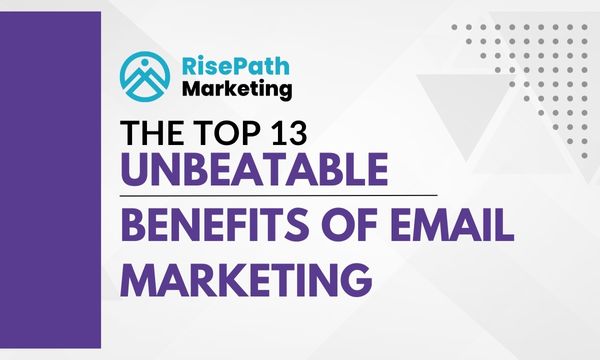
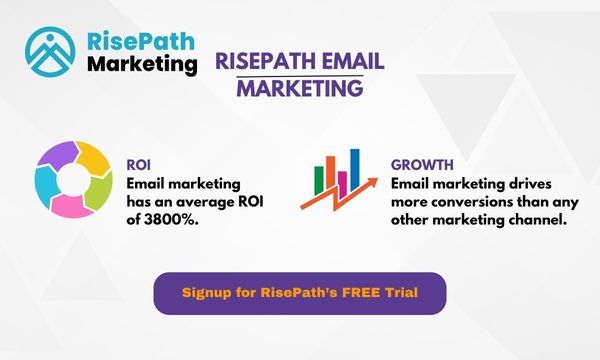
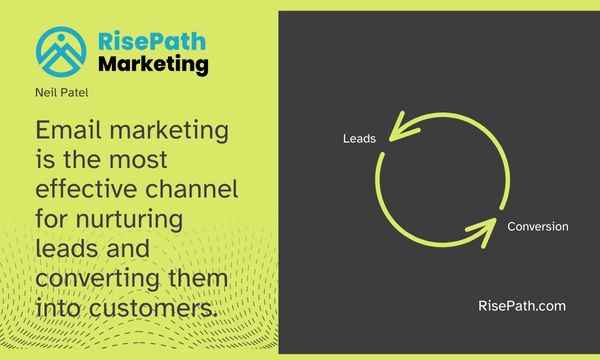
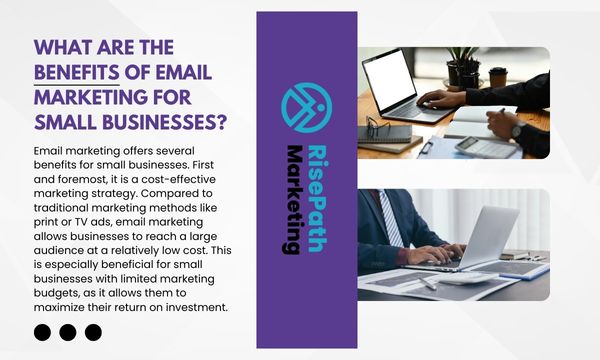
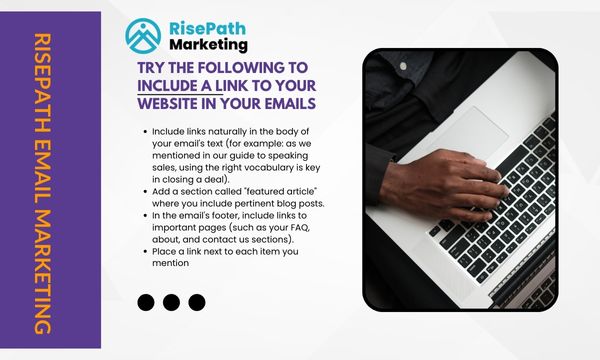
Comments are closed, but trackbacks and pingbacks are open.